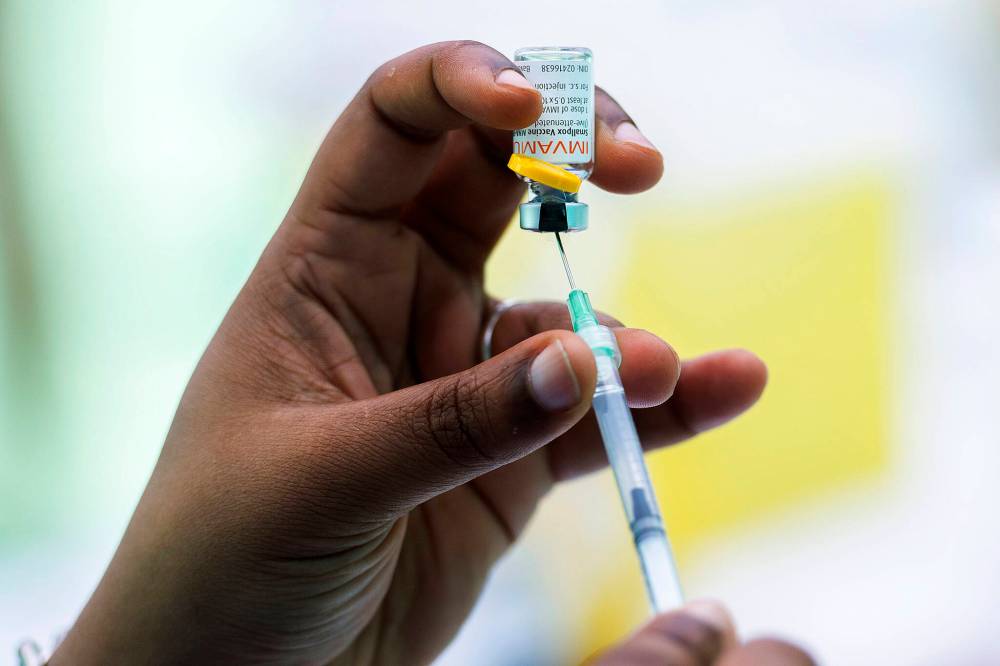Manitoba making monkeypox mistake: experts Province should proactively immunize people at high risk
Read this article for free:
or
Already have an account? Log in here »
To continue reading, please subscribe:
Monthly Digital Subscription
$0 for the first 4 weeks*
- Enjoy unlimited reading on winnipegfreepress.com
- Read the E-Edition, our digital replica newspaper
- Access News Break, our award-winning app
- Play interactive puzzles
*No charge for 4 weeks then price increases to the regular rate of $19.00 plus GST every four weeks. Offer available to new and qualified returning subscribers only. Cancel any time.
Monthly Digital Subscription
$4.75/week*
- Enjoy unlimited reading on winnipegfreepress.com
- Read the E-Edition, our digital replica newspaper
- Access News Break, our award-winning app
- Play interactive puzzles
*Billed as $19 plus GST every four weeks. Cancel any time.
To continue reading, please subscribe:
Add Free Press access to your Brandon Sun subscription for only an additional
$1 for the first 4 weeks*
*Your next subscription payment will increase by $1.00 and you will be charged $16.99 plus GST for four weeks. After four weeks, your payment will increase to $23.99 plus GST every four weeks.
Read unlimited articles for free today:
or
Already have an account? Log in here »
Hey there, time traveller!
This article was published 04/08/2022 (1223 days ago), so information in it may no longer be current.
Manitoba has decided it won’t immunize those most at risk to contract monkeypox until more vaccine is available, but medical experts warn the growing global health threat should be addressed now before cases are identified here.
“We have an opportunity here in Manitoba to use prevention measures immediately to offer maximum protection to our own citizens,” University of Manitoba infectious diseases professor Dr. Pam Orr said Thursday.
With cases on the rise across the United States, the White House on Thursday followed the World Health Organization announcement last month declaring monkeypox a public health emergency.

GRAHAM HUGHES / CANADIAN PRESS FILES
Manitoba has decided it won’t immunize those most at risk to contract monkeypox until more vaccine is available.
But until more of the vaccine called Imvamune is available, Manitoba is limiting it to those who’ve been exposed to the rapidly spreading virus, according to a medical officer of health.
“Cities like Montreal and Toronto with current outbreaks are offering pre-exposure vaccine to groups identified at risk,” Dr. Carol Kurbis said in an online information session hosted by Sunshine House, an inner-city harm reduction resource centre.
“However, global supply of Imvamune is very limited,” Kurbis said. “We don’t currently have enough vaccine in Manitoba for pre-exposure prophylaxis.”
The provincial government wouldn’t accommodate an interview request with Kurbis and wouldn’t say how many monkeypox vaccine doses Manitoba has received or administered. It would only say that further information would be made available “in the coming days.”
When Premier Heather Stefanson was asked about the province’s response to monkeypox Wednesday at an unrelated event, she declined to comment, deferring to chief provincial public health officer Dr. Brent Roussin. The provincial government wouldn’t make Roussin available for comment, either.
Canada’s chief public health officer Dr. Theresa Tam has said monkeypox is on the move and advised that vaccine access is important.
“Even if cases are not seen in one area of the country, it may arrive at any given moment,” Tam told reporters July 27.
“So I do think that remaining vigilant, but offering, you know, increasing access to the vaccine is very important.”
Last week, Tam reported 70,000 does of Imvamune were distributed to provinces and that 27,000 had been used.
Other provinces have rolled out vaccinations for the group at highest risk, which is men who have sex with men, Orr said, urging Manitoba health officials to do the same.
“It’s important to make the vaccine available and ensure that it is taken up by those at highest risk before the first case arrives in the region or province,” she said.
MIKAELA MACKENZIE / FREE PRESS FILES
Other provinces have rolled out vaccinations for the group at highest risk, which is men who have sex with men, Dr. Pam Orr said, urging Manitoba health officials to do the same.
“This is because a person is not immune at the moment they get vaccinated but rather it takes a period of time to gain immunity and, at some point, a second vaccine may be required at a later date.”
Monkeypox is a rare disease caused by a virus that’s part of the same family as the smallpox virus. Their symptoms are similar but monkeypox is milder and rarely fatal, the Centers for Disease Control says on its website.
In its last available update last Friday, The Public Health Agency of Canada reported 803 cases in several provinces and territories, including Manitoba neighbours Ontario (367) and Saskatchewan (two).
“It’s important to make the vaccine available and ensure that it is taken up by those at highest risk before the first case arrives in the region or province.”–Dr.Pam Orr
“This is a time where Manitobans need the government to be proactive, to be strong communicators and to ensure that Manitobans are equipped with the information they need so that when we start seeing cases of monkeypox — which we likely will — Manitobans are prepared with the information and know what to do,” said NDP health critic Uzoma Asagwara.
Asagwara praised the Sunshine House webinar with five Manitoba doctors sharing timely information.
Kurbis said other infections can resemble monkeypox so if someone has symptoms, it is important to get tested.
“We’ve had quite a number of tests done here in Manitoba but so far they’ve all turned out to be something other than monkeypox,” she said during the July 21 webinar. “We really need to test to make sure.”
Dr. Bunmi Fatoye told the online session the vaccine rollout will focus on those most at risk and at making sure there is equitable access.
“We felt that it’s not going to be ‘one hat fits all,’” Fatoye said, adding multiple vaccination sites and multiple providers will likely be required, with details communicated to the general public and at-risk population.
“The non-targeted public health messaging also matters so that everybody understands what it is — to help people understand how it’s spread, how to prevent it, what to look for but also — very importantly — to avoid misunderstanding, disinformation and discrimination.”–Cynthia Carr

CDC PHOTO
A negative stain electron micrograph reveals a monkeypox virus virion in human vesicular fluid.
If the emergence of cases or available data indicates the need to expand eligibility criteria, then public health will expand delivery of the vaccine at community clinics and other sites, she said.
“That’s the kind of effort that we should be seeing from the government, being proactive answering the questions that we are hearing in increased numbers from the general public who’ve seen monkeypox really become an issue in different jurisdictions in the States and now Canada,” Asagwara said.
Epidemiologist Cynthia Carr recommends targeting information early to those most at risk in a format they can use — such as the Sunshine House session — and to use multiple platforms to share accurate information with the public. Carr, who owns EPI Research Inc., said she’s aware of monkeypox information posted on the provincial government’s website but not all Manitobans will seek information there.
She suggested posting “short, snappy videos” on Instagram and TikTok with the recognizable chief provincial public health officer Roussin saying, “Here’s what we know, here’s what it looks like, who to contact if you have questions.”
“The non-targeted public health messaging also matters so that everybody understands what it is — to help people understand how it’s spread, how to prevent it, what to look for but also — very importantly — to avoid misunderstanding, disinformation and discrimination,” Carr said.
— with files from Dylan Robertson
carol.sanders@freepress.mb.ca

Our newsroom depends on a growing audience of readers to power our journalism. If you are not a paid reader, please consider becoming a subscriber.
Our newsroom depends on its audience of readers to power our journalism. Thank you for your support.













